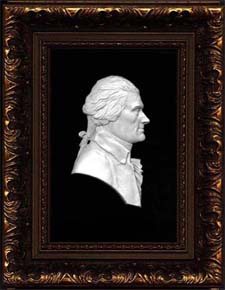 |
Wax is one of the earliest known mediums
for portraiture. Miniature wax portraits executed in
bas-relief were exceedingly popular from the mid 18th century
until the introduction and popularization of photography in the
1840ís. The portraits were generally intended for reproduction in small quantities by use of a plaster mold for the sitter's family, but larger quantities were made of popular heroes with a wider appeal. The finished portrait, usually under 4", and in shallow relief, was mounted on reverse painted glass, wax covered plaster or a sheet of wax and then framed. Josiah Wedgwood took advantage of the popularity of the wax portraits and hired modelers to create over two thousand images to be reproduced in jasper ware. The resulting medallions pictured the crowned heads of Europe, the Emperors of Rome and his "illustrious moderns". In my work, I have tried to
adhere to the high sculptural standards for portraiture in the 18th and
early 19th century. I intend to recreate the look, color and
texture as well as the scale of the earlier wax portraits. I hope the resulting bas-relief captures the spirit of the earlier portraits and brings the person portrayed a little closer to our time.
|